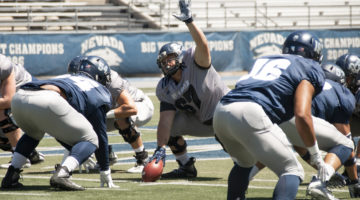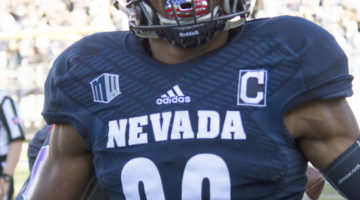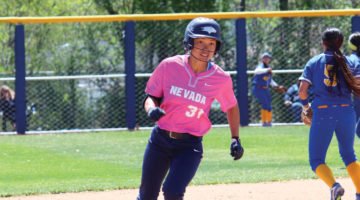By Eric Uribe
Thirty-one years as head coach. 937 wins. Four NCAA Regional appearances.
That’s what new Nevada baseball head coach Jay Johnson has to follow. Of course, those are the numbers that former skipper, Gary Powers, posted during his distinguished career with the Wolf Pack.
Following a legendary coach is no easy task. Pressure alone is enough to make a successor crumble. But not for 36-year-old Johnson.
“Pressure is external,” he said. “We can’t control what other people think. What we can control is how well we prepare, how hard we work, how invested we are in the commitment to doing things right — and if you do that again for a long period of time, the results will take care of themselves. I really believe that.”
Johnson preaches to his players to be in the moment and attack the day. It’s the same mentality that landed Johnson at Nevada.

The Wolf Pack began the Jay Johnson era with back-to-back 4-1 wins against Boston College and Santa Clara before losing to both, 7-3 and 4-3, respectively. Photo courtesy of Don Jedlovec/ Santa Clara Media Services
Growing up in the tiny town of Oroville, Calif., Johnson was born into coaching. His dad coached football, baseball and track and field. As early as six years old, Johnson was already analyzing game tape.
Johnson followed in his dad’s footsteps in 2002 by joining the coaching staff at Point Loma Nazarene in San Diego — where he had previously played two seasons as second baseman
He became the program’s head coach three years later before being lured to the University of San Diego as associate head coach. In his eight seasons with the Toreros, Johnson built a reputation for himself in recruiting and hitting.
With Johnson in charge of recruiting, the high-energy coach nabbed the No. 1 recruiting class in 2008 and the No. 2 group in 2010. San Diego won three conference championships and posted six regional appearances in his eight-year span with the team.
“For the last years, it wasn’t about becoming a Division I head coach,” he said. “It was about being the best associate head coach at University of San Diego, and before that it was about being the head coach at Loma Nazarene and winning a national championship… The ability to stay in the moment and focus on the task at hand, for myself, is the only reason why I’m here.”
Upon taking helm of the program in July, Johnson focused on two areas: building a positive team culture and establishing a platform for player development.
He tasked his players with creating a mission statement, and the team came up with “unity equals victory.”
“He’s all about buying in, which is good because in the past we’ve had good teams, but they didn’t buy into doing it for Nevada and the school, not yourself,” pitcher Tyler Wells said.
Johnson’s focus during fall camp was formulating the roster. He wanted each player to start with a clean slate and to earn their positions on the roster.
His presence has breathed life into the program, according to Wells.
“It’s an entire new life,” Wells said. “Before it was kind of a drag to go through fall camp, but it’s a different attitude now.”
Practice is dotted with jokes and new drills that keep the players on their toes, according to first baseman Austin Byler.
“It’s awesome,” said Byler, who posted a .346 batting average and dinged 40 RBIs last season. “They’re so positive and always working with you and staying late. Coach Johnson is a great coach and one of the best I’ve played with and ever will play with.”
Johnson has emphasized to his team the 10,000-hour rule popularized in the “Outliers: The Story of Success: Malcolm Gladwell.” The book states that it takes 10,000 hours of practice to become the best at a skill,
Due to NCAA restrictions, Nevada has a limited amount of hours to work with the players. Johnson has stressed to the players to work on their own. Of course, that doesn’t mean he’s not taking advantage of the time they do have together.
“The most important thing, I think, between a player-coach relationship is trust,” Johnson said. “By giving them a lot of individual attention, we got to know them extremely well and learn how they learn. A lot of guys are visual learners, some don’t learn as well by talking, so you have to set up your practices and messages accordingly.”
The Wolf Pack was slotted to finish fifth out of the seven Mountain West Conference teams in a preseason poll after a 25-32 (11-19 MW) finish a year ago.
Predictions aren’t fazing Johnson. It’s not part of his seize-the-day mentality.
“We’re making it a one-game season each time we take the field,” Johnson said. “Whatever we feel like is best that day, we’ll respond accordingly.”
Eric Uribe can be reached at cboline@unr.edu.












